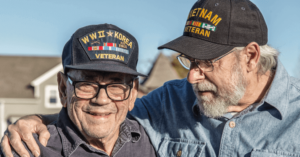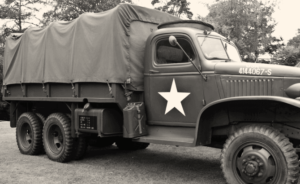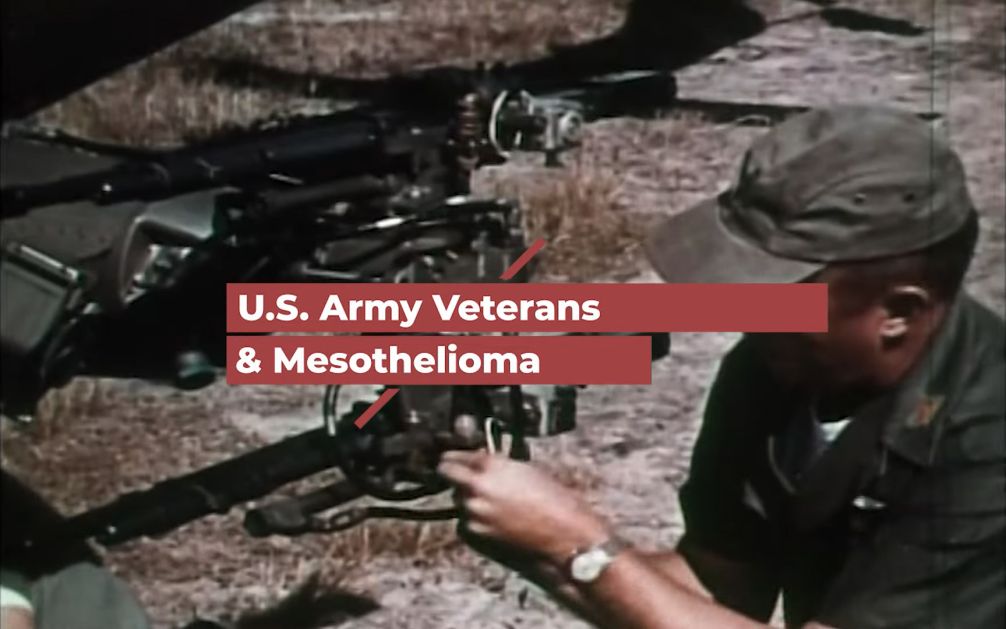The U.S. Army used asbestos in bases, vehicles, and other assets before the risks were well known. This put Army veterans at risk of mesothelioma and other deadly illnesses. Thankfully, mesothelioma Army veterans often qualify for VA benefits and financial compensation.
Benefits for Army Veterans With Mesothelioma
Veterans with mesothelioma and their families can get benefits from the U.S. Department of Veterans Affairs (VA). Mesothelioma Army VA benefits include medical treatment and monthly compensation.

Army veterans are at a high risk of mesothelioma since all military branches used asbestos between the 1930s and early 1980s. Asbestos exposure has caused tens of thousands of veterans to develop mesothelioma.
VA benefits allow Army veterans with mesothelioma to get the medical and financial aid they need and deserve. Explore available benefits below with our Free Veterans Packet.
Financial VA Benefits
Financial VA benefits can help Army veterans cover the costs that often accompany a mesothelioma diagnosis.
Army veterans with mesothelioma almost always receive a 100% disability rating from the VA, allowing them to get the highest payouts. As of 2024, married veterans can access $3,946.25 a month or more from VA disability compensation alone.
U.S. Army mesothelioma VA benefits can help cover:
- In-home caregiving services
- Medical treatments and medications
- Mortgages, rent, and living expenses
- Other bills that follow a cancer diagnosis
Mesothelioma Army veterans can apply for VA benefits right now.
VA Health Care for Army Veterans
In addition to financial compensation, Army mesothelioma veterans can get medical treatment at little to no cost through VA health care.
Getting treatment is key to living as long as possible after a mesothelioma diagnosis. Fortunately, the VA works with some of the best mesothelioma doctors in the country to treat affected veterans.
Other Compensation Options for Army Veterans
Mesothelioma Army veterans may be able to pursue financial aid from companies that made and sold asbestos-containing products. These companies hid the risks related to their products for decades to protect their profits.
Veterans can access private compensation through:
- Asbestos trust funds: Bankrupt asbestos companies were forced to put money into trusts for current and future mesothelioma patients. More than $30 billion is currently available in these trusts.
- Private claims (lawsuits): Veterans can file asbestos claims and seek financial payouts that award over $1 million on average.
Trust fund claims and mesothelioma lawsuits are never filed against the Army, other military branches, or the government. Further, filing legal claims won’t impact a veteran’s ability to get VA benefits.
Art Putt, a veteran of both the U.S. Army and Air Force, filed a mesothelioma claim after his diagnosis in 2018 to get the money he and his family deserved.
“We gave all that money to our kids, paid all their debts off, paid our house off, and made our life a little easier because we had no financial worries.”
— Art Putt, U.S. Army and Air Force veteran with mesothelioma
How Did the U.S. Army Use Asbestos?
The U.S. Army and other branches of the armed forces used asbestos for insulation and fireproofing on buildings, ships, planes, weapons systems, and equipment.
Asbestos-containing materials used by the Army included:
- Cement foundation
- Electrical wiring
- Flooring and ceiling tiles
- Gaskets
- Gloves and fireproof suits
- Insulation
- Pipes
- Plumbing
- Roofing materials
- Siding
As Army personnel worked with or around these products, asbestos fibers may have been released into the air. Those who inhaled or swallowed the fibers could develop mesothelioma 10-50 years later.
Horrifically, the Army didn’t know the risks because manufacturers of asbestos-based products concealed the deadly truth for much of the 20th century.
Video Summary: U.S. Army veterans are at risk of mesothelioma. This is because Army bases and vehicles relied on asbestos for between the 1930s and early 1980s. Get help now by calling (877) 450-8973. View Transcript
The United States Army used countless asbestos-based products from the 1930s to the early 1980s. As a result, U.S. Army veterans who served their country during this time frame are at high risk of developing mesothelioma, an aggressive cancer that can develop decades after asbestos exposure.
Since asbestos is very durable and fireproof, it was included in many products that were used to make Army bases, vehicles, and other assets. At the time, the risks of asbestos were hidden by corporations, so Army personnel didn’t know they were in danger.
Sadly, many U.S. Army veterans develop mesothelioma each year from being exposed to asbestos while they served. Mesothelioma can form in the lining of the lungs, heart, or abdomen, and is almost always fatal.
Fortunately, there is hope for U.S. Army veterans who have received a mesothelioma diagnosis.
Army veterans with mesothelioma can receive specialized treatment through the U.S. Department of Veterans Affairs. These former service members can also access financial payouts worth thousands of dollars each month, and get help for their spouse and families.
In addition to health care benefits, U.S. Army veterans with mesothelioma may also qualify for private compensation from asbestos companies. This money can provide veterans with the financial security to take care of their medical treatment and daily living expenses.
If you or a loved one served in the U.S. Army and have been diagnosed with mesothelioma, contact the Mesothelioma Veterans Center right now. We can help you explore your options and get the support you deserve.
Army Jobs With Asbestos Exposure Risk
Anyone serving in the U.S. Army may have come in contact with asbestos, but some jobs carried a higher risk of exposure.
High-risk Army jobs included:
- Automotive work
- Carpentry
- Construction
- Demolition
- Electrical work
- Millwork
- Pipefitting
- Plumbing
- Shipyard work
Army veterans who worked in the jobs above were likely exposed to asbestos every day. For example, construction workers regularly used asbestos-containing insulation, pipes, and cement.
Get a Free Veterans Packet to learn more about Army asbestos exposure risks and resources for veterans.
Army Barracks and Other Buildings
Soldiers living in Army bases and other buildings may have come in contact with asbestos. There are over 60 U.S. Army bases known to have been built with asbestos-based products such as cement sheet and insulation.
“The Army used asbestos throughout their buildings and on base to insulate various pipes.”
— Eric Hall, Capt. RIANG and VA Attorney
Military bases were not the only structures with a high risk of asbestos exposure. The use of asbestos was also common in other military buildings, such as barracks, mess halls, and office spaces.
Army Vehicles
Almost all Army vehicles built prior to the early 1980s contained asbestos, including ambulances, buses, jeeps, and tanks.


Asbestos was used in the following vehicle parts:
- Brake pads
- Clutches
- Gaskets
- Heating systems
The U.S. Army used asbestos to help keep vehicle parts from wearing down. However, working with asbestos-based car parts could send tiny fibers flying into the air. This puts Army mechanics at risk of mesothelioma and other asbestos-related illnesses later in life.
Modern-Day Risks of Mesothelioma and the Army
The Army stopped using asbestos in the 1980s when the dangers of this mineral came to light. However, millions had already been exposed. Since mesothelioma takes 10-50 years (or longer) to develop after exposure, many Army veterans remain at risk today.
Further, while steps were taken to remove most asbestos-containing products from military assets, asbestos may still be found in some older Army buildings.
Fort Campbell finally demolished several asbestos-containing buildings that dated back to World War II in 2021. A planner on the project said the buildings were “just unsafe to be in” since they used asbestos.
Additionally, Army personnel serving in the Middle East and South Asia within the last 20 years may have inhaled asbestos fibers if older buildings were blown up or damaged.
Secondhand Asbestos Exposure Risks in Army Families
The dangers of asbestos exposure were not limited to Army soldiers. Their families may have been put at risk as well if they lived on an Army base.
Soldiers could bring home stray asbestos fibers that stuck to their hair or clothes after a day’s work, exposing loved ones in the process. Family members could also unknowingly inhale or swallow asbestos fibers disturbed during Army construction or renovation projects.
Doctors and Medical Care for Mesothelioma Army Veterans
Mesothelioma is a life-threatening disease that requires urgent medical care. Thankfully, the VA health care system has top doctors on staff to treat mesothelioma in Army veterans. Learn about some of these doctors below.


Dr. Daniel Wiener
Dr. Daniel Wiener treats mesothelioma at the Boston VA, working alongside a team of other cancer specialists so patients get the best care possible.


Dr. Robert Cameron
Dr. Robert Cameron works at the West Los Angeles VA Medical Center. He has developed breakthrough treatments to help patients live longer. Visit the UCLA Health website to learn more about Dr. Robert Cameron.
Mesothelioma Army veterans can work with these doctors if they have VA health care. Use our Doctor Match to find a doctor who can help you.
Get Help Filing for Mesothelioma Army VA Benefits
If you or a loved one was exposed to asbestos while serving in the Army, you may be eligible for VA benefits such as medical treatment and financial aid. Accessing mesothelioma Army VA benefits and private compensation can provide peace of mind for you and your family.
Filing a VA claim can seem like a daunting task, but you don’t have to go it alone. Our veterans support team can walk you through the process.
We can help you:
- File for Army mesothelioma VA benefits
- Find top doctors and medical care near you
- Get the benefits and financial compensation you deserve
Get help filing for mesothelioma Army benefits and find other top resources now.
FAQs About Mesothelioma and the Army
What are the VA benefits for mesothelioma?
Mesothelioma Army VA benefits include monthly compensation, free or low-cost medical care, resources for housebound veterans, and much more.
You can also pursue VA benefits for other asbestos-related diseases like lung cancer or asbestosis from military service.
Further, your family can access VA benefits and compensation if you pass away from mesothelioma.
How much is the VA compensation for asbestos patients?
Married mesothelioma Army veterans can access $3,946.25 a month or more through VA claims.
Additionally, veterans can file private mesothelioma compensation claims and seek compensation that averages more than $1 million.
No legal action is taken against the U.S. military in this process.
Is asbestos still used in the military?
The Army and other branches of the military no longer use asbestos to make new assets due to the health risks. However, some older Army bases and buildings may still contain asbestos.
Contact our team if you worked with asbestos products in the Army and now have mesothelioma. You may qualify for VA benefits.
Who is most likely to get mesothelioma?
Army service members with the highest risk of mesothelioma regularly worked with or around asbestos-containing products.
Army mechanics, plumbers, and construction workers were among those exposed to asbestos on a daily basis while on active duty.
Has anyone survived mesothelioma?
Yes. Though the average mesothelioma life expectancy is just 12-21 months, many veterans and civilians have become long-term survivors with medical care.
U.S. Army and Air Force veteran Art Putt was diagnosed with mesothelioma in 2018, and he is still alive today. Another Army veteran named Ernie Conry lived for over 7 years with mesothelioma by undergoing treatments like surgery, chemotherapy, and radiation.
Other mesothelioma patients have lived for 15+ years thanks to top treatments.
The Mesothelioma Veterans Center has no affiliation with and is not endorsed or sponsored by Dr. Robert B. Cameron. The contact information above is listed for informational purposes only. You have the right to contact Dr. Cameron directly.






